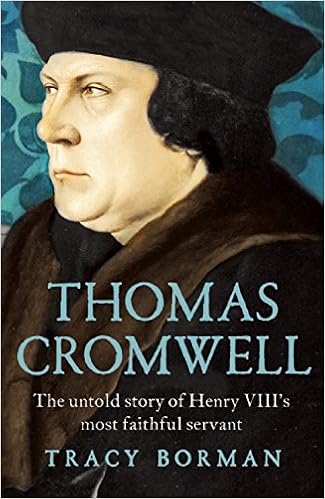
Writing a compelling biography is a high art form. This is why I value the works of able authors, such as David McCullough (“John Adams”), Richard Ellmann (“Oscar Wilde”), and Jean Edward Smith (“John Marshall: Definer of a Nation”).
Their tasks can become even more daunting, when their subject lived hundreds of years ago and research material is scant at best.
That’s why a new first-rate historical biography: “Thomas Cromwell: The Untold Story of Henry VIII’s most Faithful Servant” by British author, Tracy Borman, is such a treasure.
Her tale is set in mid-15th Century in England, in the age of the Tudors, and before the British launched their massive global and imperial empire. It’s full of riveting narratives of heroes and villains, reminding me of Will Durant’s classic - “Story of Civilization.”
In one sentence, Borman’s book, is about the political intrigues of the Court of Henry VIII. Its star player, the Henry Kissinger of his era, is Thomas Cromwell, the son of a blacksmith. Like Kissinger, Richard Nixon’s Secretary of State, the brainy Cromwell knew how to exercise the levers of state power in a cutthroat setting, on behalf of his often demented King. Life, limb and property were at risk if you ended up in the gunsight of Master Cromwell.
Cromwell was born in the village of Putney, near London, in 1485. His father had a rough edge to his character. In addition to being a blacksmith, he was also into brewing ale. He got caught for “watering down the beer,” on forty-eight different occasions! Cromwell, later in his amazing career, admitted that he, too, was a “ruffian in his younger days.”
Putney was way too small for the ambitious, self-educated Cromwell. When he was about 18 years of age, he made his way to Italy and joined an expedition to serve a short stint in the French army. After that mostly dreary experience, he ended up working in Italy for a Florentine’s merchant banker, Francesco Frescobaldi. He then moved on to the Netherlands, where he became a successful “cloth merchant.” The next important venue for the daring Cromwell was England’s capital city - London.
Cromwell’s rise from the underclass is close to unprecedented. Europe had been “an extraordinary training ground for him.” In his mid-30s, he became a lawyer in London and a later, a member of the Parliament. His legal and mercantile skills, political savvy, and international connections, brought him over time to the attention of a quintessential Court insider - Cardinal Thomas Wolsey.
Like Cromwell, Wolsey, was a commoner. He had battled his way to the top of the clerical ladder to become the King’s “closest confidante,” in a court dominated by landed gentry, blue bloods and wannabe aristocrats. When he couldn’t, however, obtain a divorce for the monarch from his then wife, Queen Catherine of Aragon, he fell out of favor. Cromwell, not only replaced his mentor, in 1532, but he got the King’s marriage annulled, so that he could marry his conniving mistress - Anne Boleyn.
For nearly a decade afterwards, the wily Cromwell was literally “second only to the King” in power in the realm. He became very rich and had all kinds of titles bestowed on him. Cromwell married and had three children as he began his climb to fame and fortune. Sadly, his wife, Elizabeth, and two of his children had died in 1528, in an “epidemic of sweating sickness…which decimated London.”
Cromwell knew the impetuous King, becoming more obese everyday, lusted after not only women, but fortune. He promised “to make him wealthy,” and indeed he did. The duo conspired successfully to target the immense riches of the Roman Catholic Church in the UK. It was estimated that its “600 or so monasteries,” then held “two-third of the nation in land and estates.” It was a huge robbery pulled off under the cover of naming the King the supreme head of the English Church and supposedly “reforming” the institution.
There is much more lethal chicanery in this book. As Cromwell, daily growing more ruthless, moved to do away with Sir Thomas More, (a future saint) and Anne Boleyn. Hundreds of Catholics, who opposed the emerging Protestant church, were also executed at his instigation.
Borman has done a masterful job bringing a villainous henchman, Thomas Cromwell, and the blood-stained court of Henry VIII, center stage.
No comments:
Post a Comment